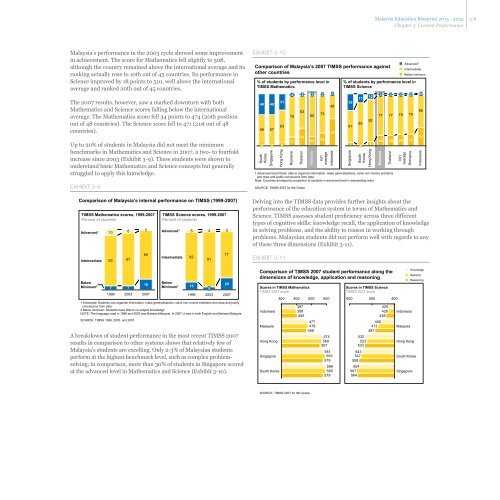Preliminary-Blueprint-Eng
Preliminary-Blueprint-Eng
Preliminary-Blueprint-Eng
You also want an ePaper? Increase the reach of your titles
YUMPU automatically turns print PDFs into web optimized ePapers that Google loves.
Malaysia’s performance in the 2003 cycle showed some improvement<br />
in achievement. The score for Mathematics fell slightly to 508,<br />
although the country remained above the international average and its<br />
ranking actually rose to 10th out of 45 countries. Its performance in<br />
Science improved by 18 points to 510, well above the international<br />
average and ranked 20th out of 45 countries.<br />
The 2007 results, however, saw a marked downturn with both<br />
Mathematics and Science scores falling below the international<br />
average. The Mathematics score fell 34 points to 474 (20th position<br />
out of 48 countries). The Science score fell to 471 (21st out of 48<br />
countries).<br />
Up to 20% of students in Malaysia did not meet the minimum<br />
benchmarks in Mathematics and Science in 2007, a two- to fourfold<br />
increase since 2003 (Exhibit 3-9). These students were shown to<br />
understand basic Mathematics and Science concepts but generally<br />
struggled to apply this knowledge.<br />
EXHIBIT 3-9<br />
Comparison of Malaysia’s internal performance on TIMSS (1999-2007)<br />
TIMSS Mathematics scores, 1999-2007<br />
Percent of students<br />
Advanced 1<br />
Intermediate<br />
Below<br />
Minimum 2<br />
10<br />
83<br />
7<br />
1999<br />
6<br />
87<br />
7<br />
2003<br />
SOURCE: TIMSS 1999, 2003, and 2007<br />
2<br />
80<br />
18<br />
2007<br />
TIMSS Science scores, 1999-2007<br />
Percent of students<br />
Advanced 1<br />
Intermediate<br />
Below<br />
Minimum 2<br />
1 Advanced: Students can organise information, make generalisations, solve non-routine problems and draw and justify<br />
conclusions from data<br />
2 Below minimum: Students have little to no subject knowledge<br />
NOTE: The language used in 1999 and 2003 was Bahasa Malaysia. In 2007, it was in both <strong>Eng</strong>lish and Bahasa Malaysia<br />
A breakdown of student performance in the most recent TIMSS 2007<br />
results in comparison to other systems shows that relatively few of<br />
Malaysia’s students are excelling. Only 2-3% of Malaysian students<br />
perform at the highest benchmark level, such as complex problemsolving;<br />
in comparison, more than 30% of students in Singapore scored<br />
at the advanced level in Mathematics and Science (Exhibit 3-10).<br />
5<br />
82<br />
13<br />
1999<br />
4<br />
91<br />
5<br />
2003<br />
3<br />
77<br />
20<br />
2007<br />
EXHIBIT 3-10<br />
Comparison of Malaysia’s 2007 TIMSS performance against<br />
other countries<br />
% of students by performance level in<br />
TIMSS Mathematics<br />
40<br />
40<br />
58 57<br />
2<br />
South<br />
Korea<br />
Singapore 3<br />
31<br />
63<br />
79<br />
17<br />
Romania<br />
63<br />
34<br />
Thailand<br />
1 Advanced benchmark: able to organize information, make generalisations, solve non-routine problems<br />
and draw and justify conclusions from data<br />
Note: Countries arranged by proportion of students in advanced level in descending order<br />
SOURCE: TIMSS 2007 for 8th Grade<br />
Hong Kong 6<br />
4<br />
3<br />
2<br />
80<br />
18<br />
Malaysia<br />
2<br />
73<br />
25<br />
Int’l<br />
average<br />
0<br />
48<br />
52<br />
Indonesia<br />
32<br />
61<br />
7<br />
Singapore<br />
17<br />
80<br />
3<br />
South<br />
Korea<br />
10<br />
82<br />
Hong Kong 8<br />
Malaysia Education <strong>Blueprint</strong> 2013 - 2025<br />
Chapter 3 Current Performance<br />
3<br />
3<br />
3<br />
77 77 75 75<br />
20<br />
Malaysia<br />
20<br />
Thailand<br />
22<br />
Int’l<br />
average<br />
Romania<br />
Advanced<br />
Intermediate<br />
Below minimum<br />
1<br />
% of students by performance level in<br />
TIMSS Science<br />
Delving into the TIMSS data provides further insights about the<br />
performance of the education system in terms of Mathematics and<br />
Science. TIMSS assesses student proficiency across three different<br />
types of cognitive skills: knowledge recall, the application of knowledge<br />
in solving problems, and the ability to reason in working through<br />
problems. Malaysian students did not perform well with regards to any<br />
of these three dimensions (Exhibit 3-11).<br />
EXHIBIT 3-11<br />
Comparison of TIMSS 2007 student performance along the<br />
dimensions of knowledge, application and reasoning<br />
Scores in TIMSS Mathematics<br />
TIMSS 2007 score<br />
Indonesia<br />
Malaysia<br />
Hong Kong<br />
Singapore<br />
South Korea<br />
300 400 500 600<br />
397<br />
398<br />
405<br />
477<br />
478<br />
468<br />
SOURCE: TIMSS 2007 for 8th Grade<br />
574<br />
569<br />
557<br />
581<br />
593<br />
579<br />
596<br />
595<br />
579<br />
Scores in TIMSS Science<br />
TIMSS 2007 score<br />
600<br />
500<br />
425<br />
426<br />
438<br />
458<br />
473<br />
487<br />
532<br />
522<br />
533<br />
543<br />
547<br />
558<br />
554<br />
567<br />
564<br />
400<br />
2<br />
23<br />
Indonesia<br />
Malaysia<br />
Hong Kong<br />
Singapore<br />
0<br />
65<br />
35<br />
Indonesia<br />
Knowledge<br />
Applying<br />
South Korea<br />
Reasoning<br />
3-8


